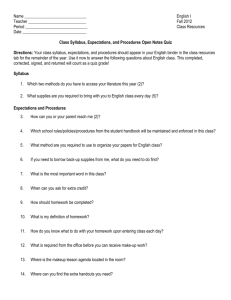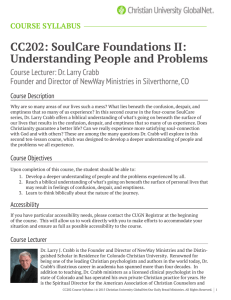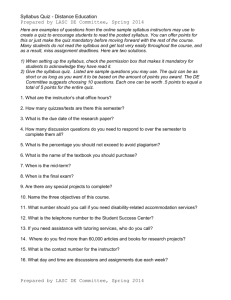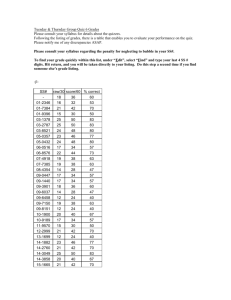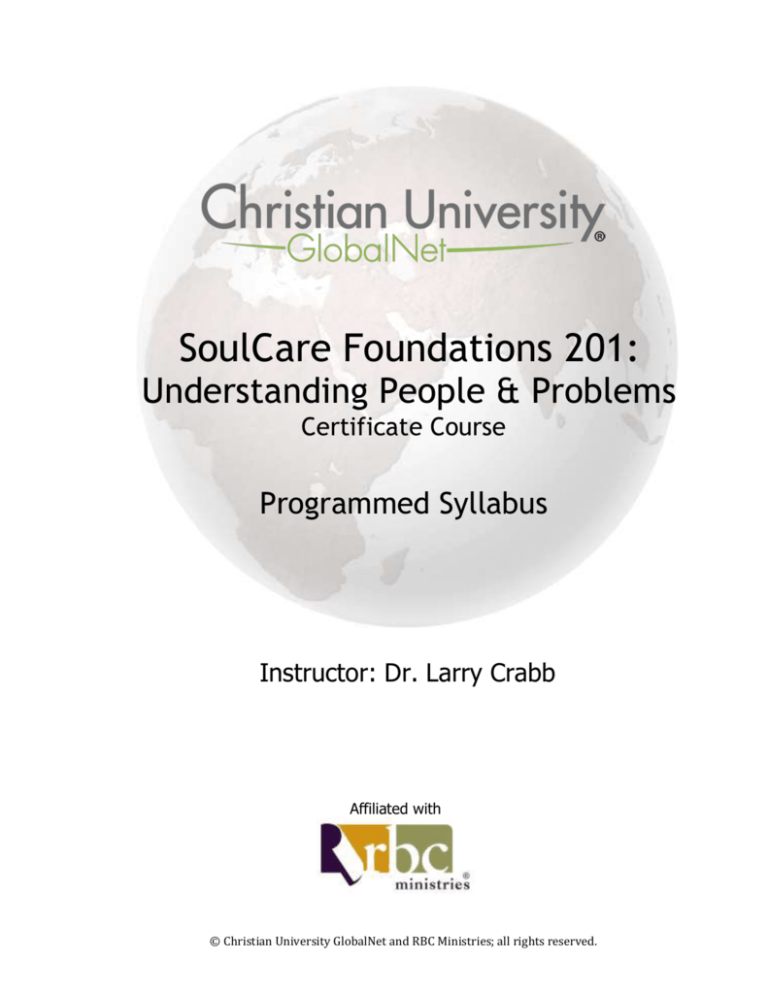
SoulCare Foundations 201:
Understanding People & Problems
Certificate Course
Programmed Syllabus
Instructor: Dr. Larry Crabb
Affiliated with
© Christian University GlobalNet and RBC Ministries; all rights reserved.
Course Description
Why are so many areas of people’s lives such a mess? What lies beneath the
confusion, despair, and emptiness that so many experience? In this second course in
the four-course SoulCare series, Dr. Larry Crabb offers a biblical understanding of
what’s going on beneath the surface of lives that results in the confusion, despair, and
emptiness faced by many.
Does Christianity guarantee a better life? Can people really experience more satisfying
soul-connection with God and with others? These are among the many questions Dr.
Crabb will explore in this second ten-lesson course which was designed to develop a
deeper understanding of people and the problems that all experience.
Course Objectives
To develop a deeper understanding of people and the problems experienced by
all
To reach a biblical understanding of what’s going on beneath the surface
of personal lives that may result in feelings of confusion, despair, and
emptiness
To learn to think biblically about the nature of the journey
Course Methods
Throughout this course, a number of methods will be used to engage the students in
learning and processing information, interacting with other students, and applying the
learning to their lives. These methods include the following:
Media/Materials
The course will include media presentations of lectures and supplementary materials to
be viewed, listened to, and/or read throughout the ten lessons of the course. Details
on these materials will follow in the Course Requirements section.
Interaction
Whether sitting in a traditional classroom or studying from a distance, students benefit
from interaction and collaboration with other students. In order to meet this need in
distance theological education, CUGN.com offers structures and resources to
encourage effective community interaction in this course.
Syllabus–SoulCare 201: Understanding People & Problems
© Christian University GlobalNet and RBC Ministries. All rights reserved.
Page
2
CUGN.com Online Interactivity Forum fosters peer-to-peer interaction in a global,
threaded discussion. Students are required to respond to relevant questions posted by
the instructors; students are also encouraged to read and respond to the posts of
fellow students.
Reflection
Through journaling and the use of interactive exercises, CUGN.com provides many
opportunities for students to reflect on what they have learned, what they believe, and
where they are challenged. The goal of these reflections is personal spiritual growth
and transformation.
Web Journal
Many of the assignments ask students to record their thoughts in a Course Journal.
Students may use a paper notebook for this, or, as an alternative, they may use the
Web Journal to record thoughts and reflections as they go through the course. Web
Journal entries can be viewed only by the student and by the site administrator, but
are not graded.
Lesson Objectives
At the end of each lesson, students should be able to accomplish the objectives listed
below.
Lesson 1: The Key Concepts in SoulCare: Review and Introduction to Building on
Them
Be able to read brief descriptions of each of the Ten Key Concepts and feel
excitement about the powerful potential of soul care: the release of spiritual
passion
Be able to read the brief descriptions of each of the Ten Key Concepts and
sense directions that might be followed in SoulCare conversations: the
development of spiritual wisdom
Feel more equipped and eager to develop a rich understanding of who people
are and why people have problems
Demonstrate understanding of the materials by scoring 70% or better on the
quiz
Syllabus–SoulCare 201: Understanding People & Problems
© Christian University GlobalNet and RBC Ministries. All rights reserved.
Page
3
Lesson 2 : A New Paradigm: SoulCare as Our Greatest Need
Honor the legitimate place of biological/chemical/neurological causes of human
struggles but not let their legitimate place dislodge the central place of spirit
and soul issues in understanding people
Be able to conceptually distinguish among “brain-soul” problems, “soul-brain”
problems, and “mostly soul” problems
Understand the deficiencies of both the standard professional paradigm and the
increasingly popular biological paradigm for understanding people and their
problems; thoughtfully consider the spiritual paradigm as one engages in soul
care
Demonstrate understanding of the materials by scoring 70% or better on the
quiz
Lesson 3: SoulCare is for Human Beings: What it Means to Bear God’s Image
Understand that personal wholeness depends on relating well (to God and
others), not on things going well
See hurting people as capable of living as whole people to the degree that they
relate as Jesus relates
Recognize that the central ingredient in powerful conversation is love, not
expertise (hence the passion in the passion-wisdom model of SoulCare)
Demonstrate understanding of the materials by scoring 70% or better on the
quiz
Lesson 4: Designed to Relate 1: The Capacity to Desire
Recognize the importance of providing a safe relationship (free of judgment)
that allows others to discover their core desire for God
Learn to think about three levels of desire—desires of convenience, of
importance, and of necessity—as one engages in soul care
Realize that people “aim too low” when they prioritize the satisfaction of desires
of convenience or importance.
Demonstrate understanding of the materials by scoring 70% or better on the
quiz
Lesson 5: Designed to Relate 2: The Capacity to Perceive
Think hard about what it takes to deeply change, to shift from self-dependence
to God-dependence as life is encountered
Understand how perception drives emotions and choices, that is, how what we
believe in a given situation largely determines what we feel and do
Syllabus–SoulCare 201: Understanding People & Problems
© Christian University GlobalNet and RBC Ministries. All rights reserved.
Page
4
See that traumatic experiences (such as sexual abuse) not only cause terrible
pain, but they also shape false beliefs; understanding that false beliefs are the
greater problem
Demonstrate understanding of the materials by scoring 70% or better on the
quiz
Lesson 6: Foolishness: The Enemy of SoulCare
More clearly understand the proverb: “Foolishness is bound up in the heart of a
child” (Proverbs 22:15); also recognize foolishness as (a) a core moral disease
in each individual and (b) the root of all personal problems
Grasp that foolishness is a passionate conviction (a) that the experience of
satisfaction is necessary to function as a whole person and therefore (b) that
more than God is sometimes needed to be whole
Understand the first three of the seven stages of foolishness and see how the
congenital disease of foolishness begins to spread and take root in a child’s
heart
Demonstrate understanding of the materials by scoring 70% or better on the
quiz
Lesson 7: Foolishness: The Enemy of SoulCare (Continued)
More fully appreciate what lies beneath the angst (confusion, despair,
emptiness) that so many teenagers experience
Better identify and appreciate the two vital ingredients of powerful parenting
that parents can provide for their struggling (disillusioned) teenagers
Develop a clearer understanding of how sin, unchecked by the Holy Spirit,
grows in the depths of the human heart from cradle to grave
Demonstrate understanding of the materials by scoring 70% or better on the
quiz
Lesson 8: Designed to Relate 3 and 4: The Capacity to Choose and the Capacity
to Feel
Be able to build an understanding of image-bearers as people with the capacity
to desire (Lesson 4) and to think (Lessons 5–7) and to understand people’s
capacity to choose
Better understand why image-bearers with the God-given capacity to choose so
often feel stuck and addicted, unable to freely choose actions
Recognize the relationship between hidden, unrecognized goals and behaviors
that are experienced as compulsive, not freely chosen; (i.e., behaviors that
pursue unrecognized goals are not experienced as free choices)
Syllabus–SoulCare 201: Understanding People & Problems
© Christian University GlobalNet and RBC Ministries. All rights reserved.
Page
5
Understand the source of anxiety (uncertain goals), rage (blocked goals), and
self-hatred or guilt (unreachable goals)
Demonstrate understanding of the materials by scoring 70% or better on the
quiz
Lesson 9: The Corrupted Image: We’re Hopeless and Helpless
More deeply understand why the yet-to-come “third reformation,” the explosion
of soul care in Christian community, depends so radically on the work of the
Holy Spirit
Appreciate the vital role of curiosity in soul care, becoming more deeply
convicted about personal lack of curiosity, and becoming more powerfully drawn
to become curious while engaging in soul care
See how curiosity about what is really going on in another’s life will express all
that has been learned so far about care of the soul
Demonstrate understanding of the materials by scoring 70% or better on the
quiz
Lesson 10: Don’t Bless the Mess: We Need Something More
Assimilate a truth that is foundational to all effective soul care: Christianity is
not centrally about providing a better life now: it is about providing a better
hope now and a perfect life forever
Understand that the four capacities of image-bearing people (the capacities to
desire, think, choose, and feel) have all been severely and, without the gospel,
hopelessly corrupted
Articulate an understanding that, apart from the Spirit, people use God-given
capacities wrongly – to use God for experience of satisfaction now through the
blessings of life – rather than to know God for His glory as the source of true
meaning and joy forever.
Express confident excitement, envisioning what could be the story of a wise
soul, the story of someone who uses his or her capacities as an image-bearer to
fulfill the purposes of God
Demonstrate understanding of the materials by scoring 70% or better on the
quiz
Syllabus–SoulCare 201: Understanding People & Problems
© Christian University GlobalNet and RBC Ministries. All rights reserved.
Page
6
Course Requirements
In order to receive a certificate of completion, the student must complete the course
requirements within a 90-day period. Those requirements include
Viewing, listening to, or reading the lectures for each lesson
Participating in the online interactive forum
Keeping a journal in response to reflection questions and Bible studies
Taking ten quizzes and a final examination, scoring a final grade of 70% or
higher.
Additional information about these requirements is provided below.
Video-based teaching
The primary teaching session in each lesson is provided in streaming video in the Flash
video format (FLV). For international or domestic students who do not have the
bandwidth required to view the video (384 Kbps DSL minimum), we provide the option
of listening to the teaching via Flash audio files or reading the lesson from a transcript
of the teaching video. The transcripts contain screen captured images of important
images in the video.
Multisensory learning
Because the primary teaching information is provided in video, audio and PDF text
documents, students can choose the medium (or combination of media) that most
closely aligns with their individual learning styles. Multiple options are also provided for
students with auditory and visual learning challenges.
Teaching videos: Each of the lessons in this course contains a teaching video
of approximately twenty-eight minutes in length. These instructional videos are
required viewing, and can be watched as many times as needed. The same
content is available in audio files and a text files (PDFs) for students who can
benefit from these alternative media.
The Key Concepts in SoulCare: Review and Introduction to Building on Them
A New Paradigm: SoulCare as Our Greatest Need
SoulCare is for Human Beings: What it Means to Bear God’s Image
Designed to Relate 1: The Capacity to Desire
Designed to Relate 2: The Capacity to Perceive
Foolishness: The Enemy of SoulCare
Syllabus–SoulCare 201: Understanding People & Problems
© Christian University GlobalNet and RBC Ministries. All rights reserved.
Page
7
Foolishness: The Enemy of SoulCare (Continued)
Designed to Relate 3 and 4: The Capacity to Choose and the Capacity to Feel
The Corrupted Image: We’re Hopeless and Helpless
Don’t Bless the Mess: We Need Something More
Glossary terms:
Throughout the course, students will find glossary terms highlighted with
hyperlink connections to explanations and definitions. Students should become
familiar with these words and their meanings as a requirement of this
coursework.
Quizzes and Final Exam
The quizzes and the final exam will cover the material from the recorded lectures
presented by Dr. Larry Crabb. Because of the depth of Dr. Crabb’s presentations, and
the importance of understanding the material presented, students should consider
viewing the material multiple times. The difficulty of the quizzes and final exam reflect
the importance of thorough mastery of the concepts and practices presented by Dr.
Crabb in the SoulCare series. Students should consider continuing with SoulCare 301,
and 401 if they desire to actively participate in SoulCare relationships.
Online Forum
Participants will interact with other students worldwide in an ongoing asynchronous
threaded discussion of several course topics in each lesson.
In order to get the fullest benefit from the Forum, students should complete the forum
assignment after they have listened to all the lectures. Then they should return to the
forum after finishing the course to see how others respond. The following steps are
instructions to the students for completing the assignment:
Read the question(s) posted by the instructor in the Course Discussion section
of each lesson.
Choose the corresponding discussion topic.
Read each question again and share your thoughts about each question with
other students.
Take the time to read other students' postings.
Objective: to develop critical thinking skills through personal interaction with the content
of the course and the responses of others within a diverse community of learners.
Syllabus–SoulCare 201: Understanding People & Problems
© Christian University GlobalNet and RBC Ministries. All rights reserved.
Page
8
Personal Reflection and Evaluation
To integrate academic studies with the walk of faith, students are asked to reflect on
the content of the course and evaluate their lives in light of what has been learned.
The following questions will guide that individual reflection process:
Step 1:
Review
Think about the material you have studied in this course. Then ask these
questions: What are one or two things you learned that you did not
know before this study? What was there in the teaching that made you
look at the Bible or something in the Bible in a new way?
Step 2:
Assess
Think about your life, both past and present. Given the insights or
understanding that you gained in this course, what changes do you
need to make in the way you think or behave?
Step 3:
Apply
What specific steps will you take in order to put these positive
changes (from Step 2) into practice in your life?
Step 4:
Record
Write your responses to the above reflections in your journal (web,
notebook, or computer)
Community Reflection and Interaction
Step 1:
Choose
Since the Holy Spirit uses the input of others to guide and form His
people, share what you learned from this course with another person.
You might choose from these categories of people in your life:
Someone with whom you have a close relationship
Someone who is a mature Christian ministry leader
Someone who is not a family member
Someone who values the spiritual formation process
Someone who is familiar with and values the subject of the course
Someone who has experience using the content of the course in
ministry
Syllabus–SoulCare 201: Understanding People & Problems
© Christian University GlobalNet and RBC Ministries. All rights reserved.
Page
9
Step 2:
Discuss
Ask that person what advice, deeper insights, or broader applications
they might offer from their own life and experience.
Step 3:
Respond
In light of the course content and your discussions with another
person, do you believe that the assessment and application decisions
you reached are appropriate? Why or why not? Add your thoughts and
insights to your journal.
NOTE: The degree of effort students put into this assignment will determine its
benefit. If by the end of this course students have not yet reflected critically on life in
light of what has been studied, this assignment will be a helpful guide in that spiritually
transforming process.
Important note: This course is not designed for formal, professional training in
counseling or to qualify students as licensed therapists. Further, it is not a replacement
for professional therapy a particular may need. Students who are experiencing
personal crises should seek the help of a licensed therapist.
Course Grading and Requirements
SoulCare 201: Understanding People & Problems has ten lessons. As each
lesson is completed, the student should prepare for a ten-question quiz that covers the
material taught in that particular lesson. Twenty minutes are allowed for the
completion of each quiz. The student may take each quiz one or two times. If the
student takes a quiz twice, his or her quiz grade will be the average of the two
attempts. A final course grade must be 70% or higher in order to pass the course and
receive the certificate of completion. Participation in discussion questions is required of
all students; participation is not optional for the certificate to be issued. CUGN.com
reviews student participation and grades before validating certificates of completion.
After completing all lessons, discussions, personal journaling and quizzes, the student
may take the final exam. The final exam consists of 50 questions that cover all ten
lessons in the course.
Quizzes and Exams
Syllabus–SoulCare 201: Understanding People & Problems
© Christian University GlobalNet and RBC Ministries. All rights reserved.
Page
10
Quizzes .............................. 40% of Course Grade
Final Exam ......................... 60% of Course Grade
Other Course Requirements
Other course requirements noted in this syllabus will be validated before a Certificate
of Completion is awarded to any student.
Course Use in Church Settings and Small Groups
This course can easily be used in a small group or church setting. In that case, the
following suggestions might be helpful in order to gain maximum benefit from all of
the resources available relate to this study. For materials to assist you, go to
CUGN.com and search for Church Resources.
Notes Regarding This Syllabus
This syllabus is designed to provide learners with an overview of the course. Specific
assignments are contained in each lesson.
Individuals taking the class for academic credit are responsible for the syllabus
requirements of the specific institution through which the course is offered. Each
individual institution has reserved the right to add additional reading requirements and
to alter the syllabus to meet their accreditation requirements. Students seeking
academic credit should check with their academic institution for details.
Syllabus–SoulCare 201: Understanding People & Problems
© Christian University GlobalNet and RBC Ministries. All rights reserved.
Page
11



